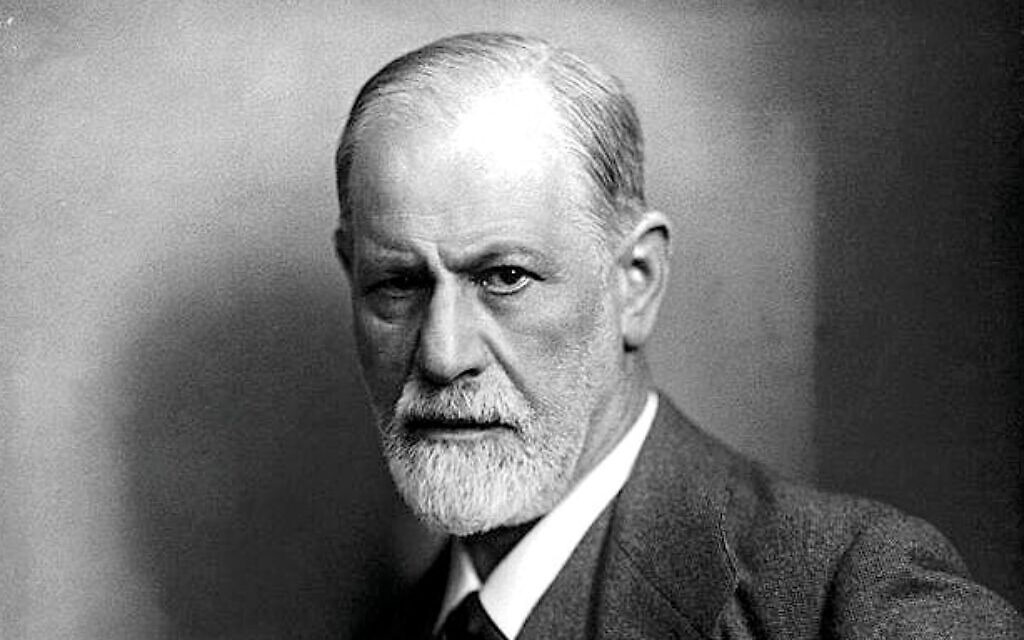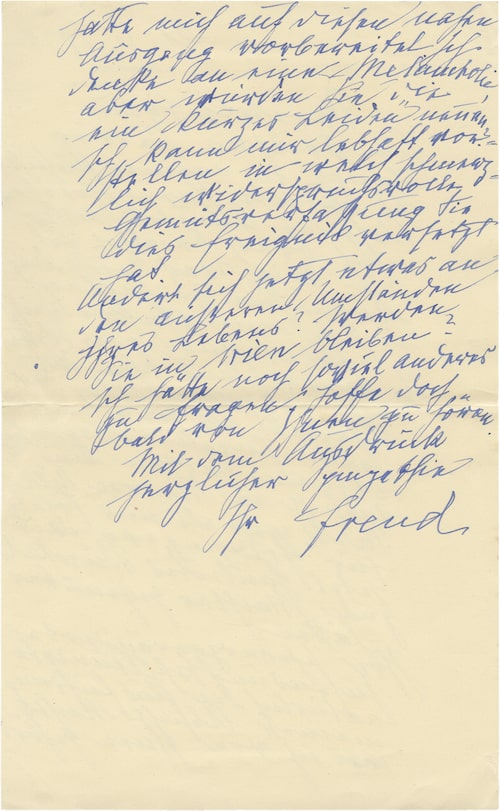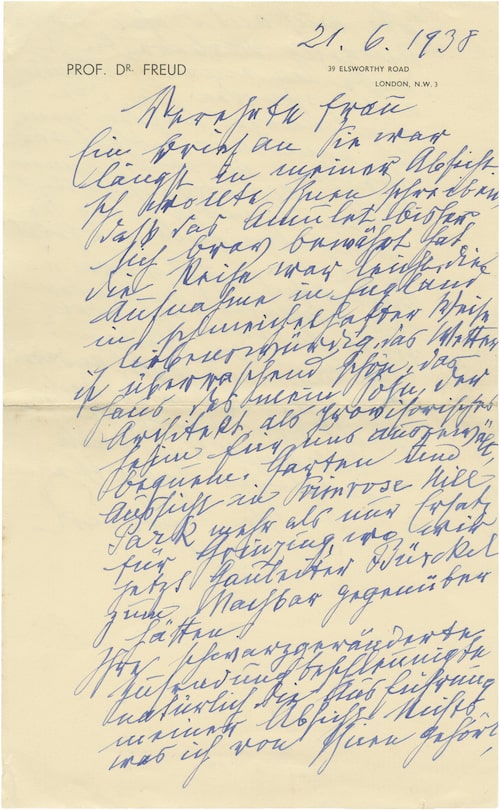Sigmund Freud letter showing rare sentimental side to be sold in Jerusalem
The letter, written in German and dated June 21 1938, was sent several weeks after he fled the Nazis in his native Austria and moved to London.
A handwritten letter by Sigmund Freud, which shows a rare sentimental side to the 20th-century thinker as well as insight into the life of a prominent Jewish refugee amid the advance of the Nazis, is set to go on sale in Jerusalem.
The letter, written in German and dated June 21 1938, was sent several weeks after Freud fled the Nazis in his native Austria and moved to London.
In it, he writes to philanthropist Margaret Stonborough-Wittgenstein, a friend and patient from back home, sympathising with her over a personal tragedy and appearing to seek glimpses of life back in Vienna under Nazi rule.
Get The Jewish News Daily Edition by email and never miss our top stories Free Sign Up
The letter shows a softer side of Freud, a trait that is not commonly attributed to the father of psychoanalysis, according to Joel Whitebook, author of the book Freud: An Intellectual Biography, and director of the psychoanalytic studies programme at New York’s Columbia University.
“People often portray Freud as this cerebral, intellectual guy. But he was very, very sensitive to his environment and aesthetics,” Mr Whitebook said.
In the letter, Freud comforts Stonborough-Wittgenstein after her ex-husband had taken his own life and inquires about her state of mind.
“I can well imagine in what painful and conflicted mental state the event placed you. Are your circumstances now going to change? Will you remain in Vienna? I would like to ask you much more,” he wrote.
With this emotional subject, he signs off warmly: “I hope to hear from you soon, with my deepest sympathy, Freud.”
The unusual and informal dynamic between the two as friends and doctor-patient was common and “part of the Viennese scene”, according to Mr Whitebook.
The letter is “evidence of how closely knit” the Jewish community, the cultural world and the scientific world were at the time, he added.
Stonborough-Wittgenstein was the daughter of Karl Wittgenstein, an iron and mining magnate, and one of the wealthiest men in Austria.
Although members of the Wittgenstein family converted to Christianity, they had Jewish ancestry, subjecting them to Nazi Germany’s racial laws.
However, their financial resources, elite status in society and conversion to Christianity were enough to protect them from Nazi persecution.
They were still part of the “prominent Jews in the German speaking world”, Mr Whitebook said.
Freud, who was Jewish, was renowned at the time but did not have the status to placate the Nazis and ensure his safety.
By 1933, his books had started to be publicly burned and his daughter Anna was arrested by the Gestapo.
The family managed to flee with the help of Anton Severwald, a high-ranking Nazi officer who was a fan of Freud’s work.
The Freud family left Austria on June 4 1938, crossing into France and settling in England, where Freud wrote his letter.
“The letter was already censored so he cannot really write what he thinks about the Nazis,” said Meron Eren, co-owner of Kedem Auction House, which is conducting the sale.
Instead, Freud used a sense of humour to compare London’s Primrose Hill Park to his summer holiday spot in Grinzing, drily joking that Nazi official Josef Buerkel “would have now become the next-door neighbour”.
Buerkel was the new governor after helping to carry out the annexation of Austria for Nazi Germany in March 1938 and became a resident of the Vienna suburb.
“That is kind of his way to say that things look different in Vienna now,” Eren said.
Although Freud reluctantly left Vienna, Mr Whitebook said he was “treated like a rock star” in his new life in London.
His work was widely popular and well known, which was not the case in his conservative life in Vienna.
Freud had an antiquities collection from the Ancient East and Asia, including amulets, one of which Stonborough-Wittgenstein presumably gave him before he left.
“The amulet has so far proven its worth. The journey was easy, the reception in England was flatteringly pleasant, the weather is surprisingly nice and the house my architect son has chosen for us as a temporary home is comfortable,” Freud wrote.
The letter came towards the end of Freud’s life.
When he was finally established in London, Freud was 83 years old and sick with cancer.
He lived about one more year until his death on September 23 1939.
The letter was bought by an Israeli collector at auction in Europe and is now being resold in Jerusalem.
It will be up for auction on December 3, with bidding to start at 6,000 dollars (£4,600).

Thank you for helping to make Jewish News the leading source of news and opinion for the UK Jewish community. Today we're asking for your invaluable help to continue putting our community first in everything we do.
For as little as £5 a month you can help sustain the vital work we do in celebrating and standing up for Jewish life in Britain.
Jewish News holds our community together and keeps us connected. Like a synagogue, it’s where people turn to feel part of something bigger. It also proudly shows the rest of Britain the vibrancy and rich culture of modern Jewish life.
You can make a quick and easy one-off or monthly contribution of £5, £10, £20 or any other sum you’re comfortable with.
100% of your donation will help us continue celebrating our community, in all its dynamic diversity...
Engaging
Being a community platform means so much more than producing a newspaper and website. One of our proudest roles is media partnering with our invaluable charities to amplify the outstanding work they do to help us all.
Celebrating
There’s no shortage of oys in the world but Jewish News takes every opportunity to celebrate the joys too, through projects like Night of Heroes, 40 Under 40 and other compelling countdowns that make the community kvell with pride.
Pioneering
In the first collaboration between media outlets from different faiths, Jewish News worked with British Muslim TV and Church Times to produce a list of young activists leading the way on interfaith understanding.
Campaigning
Royal Mail issued a stamp honouring Holocaust hero Sir Nicholas Winton after a Jewish News campaign attracted more than 100,000 backers. Jewish Newsalso produces special editions of the paper highlighting pressing issues including mental health and Holocaust remembrance.
Easy access
In an age when news is readily accessible, Jewish News provides high-quality content free online and offline, removing any financial barriers to connecting people.
Voice of our community to wider society
The Jewish News team regularly appears on TV, radio and on the pages of the national press to comment on stories about the Jewish community. Easy access to the paper on the streets of London also means Jewish News provides an invaluable window into the community for the country at large.
We hope you agree all this is worth preserving.
-
By Brigit Grant
-
By Laurent Vaughan - Senior Associate (Bishop & Sewell Solicitors)
-
By Laurent Vaughan - Senior Associate (Bishop & Sewell Solicitors)
-
By Laurent Vaughan - Senior Associate (Bishop & Sewell Solicitors)
-
By Laurent Vaughan - Senior Associate (Bishop & Sewell Solicitors)
























